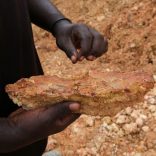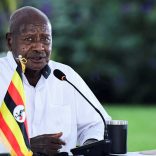Ghana has lost $11 billion to gold smuggling, links to UAE, report finds
Watch: The absence of the State in Africa is consequence of inadequate models of governance imposed during colonial times – UN advisor

Screen grab: ISS Africa
The UN Under-Secretary for Africa, Cristina Duarte, considered yesterday that the absence of the State in many countries on the continent is a consequence of a model of colonial governance imposed more than six decades ago.
“In most cases it is the consequence of inadequate models of governance that were imposed during colonial times and that are based on a hyper centralization that does not acknowledge African diversity. In the face of State actions that seem to benefit a few , as an exclusionary form of governance, grieved citizens are easy to manipulate,, by all their actors” she stressed.
The special advisor for Africa to the Secretary-General of the United Nations (UN), António Guterres, spoke at the seminar “How can Africa prevent unconstitutional changes of government?, organized by the Institute of Security Studies (ISS) in Pretoria and the Cabinet of the UN Special Adviser for Africa (UN-OSAA).
“This absence of the State, not only physical absence, but generally from a perspective of service provision, creates a vacuum for all the actors to comply and provide services, and change norms and identities,” Duarte said, adding that “it is further aggravated by the lack of inclusion of specific groups”.
About the post-independence governance of the old liberation movements, some in power consecutively for fifty years, as is the case of the Front for the Liberation of Mozambique (Frelimo), or for around 30 years in the case of the African National Congress (ANC) in South Africa, the UN Under-Secretary General stressed the need to understand whether African democracies currently are currently facing challenges in service delivery, “Are African democracies facing challenges in delivering? If yes, why? We need to deed dive and understand the why in order not to accept external one-sided explanations”.
“These challenges can be addressed by applying the peace, security and development nexus approach, in particular, first, investing in social inclusion, equal access to public services, employment and income distribution; these are critical elements to achieve equality and articulate the African Union master roadmap of practical measures to silence the guns in Africa,” Duarte highlighted.
Duarte also advocated that “ending the vicious cycle of unconstitutional changes of government in Africa will, first and foremost require, addressing both external and internal factors”.
“From an internal factor standpoint, because African policy makers control internal factors, it is key to address governance and leadership gaps. The interconnected issues of instability, conflict and development must be addressed collectively keeping in mind rresillience. At the end of the day, institutions do matter,” the UN official stressed.
Watch.












Leave a Reply
Be the First to Comment!
You must be logged in to post a comment.
You must be logged in to post a comment.